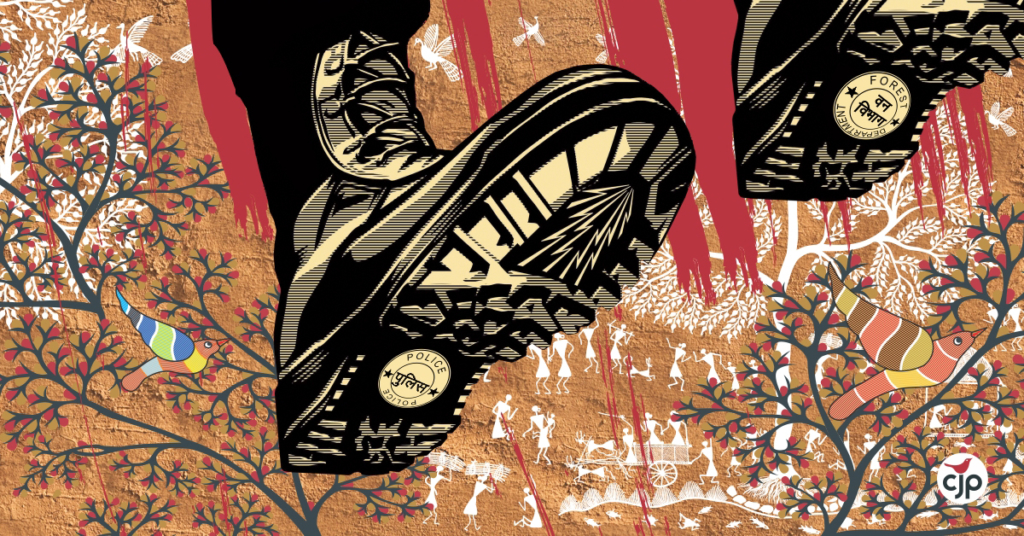“We are fighting the Forest Department for our right to the water, the forests and the land. We say that all of this [forests] is ours and shall remain ours. This forest is our livelihood. This is our ancestor’s land. We have been living here forever,” said 65-year-old Adivasi, Ram Surat Singh.
However, the frustrated Adivasis’ claims were never accepted by the forest department that kept enforcing numerous laws upon the forest-dwellers living in Kaimur Pahar, Bihar.
“We are left helpless. What do we do? Where can we go? We have no idea. No one in our homes has a government job or a business to earn a living. On the other hand, the forest department capitalises on the forest wealth. They have made life difficult for lakhs, crores of Adivasis,” he said.
Among its four pillars of action, the land and livelihood rights of Adivasis and traditional forest dwellers, is one. CJP, with its expertise in navigating cases of human rights violations in the courts and beyond has been active on the issue; partnering with the All India Union of Forest Working Peoples (AIUFWP) since 2017 to battle any setback to these rights in the courts. This includes legally fighting back against malicious prosecution of leaders of the community and defending the Forest Rights Act, 2006 in the Supreme Court. We stand with the millions of Forest Dwellers and Adivasis whose lives and livelihoods are threatened. Please support our efforts by donating here.
Resolved to act against this injustice, the aged resident of Baradih village in Kaimur district wrote letters to the Citizens for Justice and Peace, the All India Union of Forest Working People (AIUFWP) and a delegation of the Delhi Forum who visited Adhaura from September 22 to September 27 to look into the repressive action of the local police.
According to Singh, the forest authorities, after declaring the Kaimur Wildlife sanctuary, banned Adivasis from collecting herbs like Lasha, Melavar, Gurmar, Shatavar and Tendu. As a result, local inhabitants of the plateau suffered losses in crores of rupees. He said the authorities had cut off their prime source of earnings.
Moreover, they also banned wood-cutting despite long-standing traditions, depriving local forest-dwellers of basic amenities like charpoys, posts, chairs, tables, plows and houses among other things. Singh said that Adivasis have a right to sell wood at markets but are unable to do so because of the harassment of the forest department.
“We live under the dominance of the forest department. They beat us, lodge fake cases against us and send us to jail. We have to fight these lawsuits. They have stolen the axe from us when in fact it is a Constitutionally-granted weapon to fend off wild animals,” he said.
Adding insult to injury, he narrated how forest rangers pressured villagers to provide them with chicken, mutton, curds, milk and ghee.
“We fearfully give them whatever they want so that they don’t lodge a case against us. We are tortured and exploited in this manner,” he said.
Singh alleged that the forest department had taken control of the entire area using the labels of Wildlife Sanctuary and the Tiger Reserve as an excuse.
“Technically, this land was given to us by Vinoba Bhave but now the government [forest department] has taken it from us for plantation purposes. They are breaking down our houses and fields in the forest for plantation! They seem to have made it their agenda to destroy our co-existence with the forest and wild animals,” he said.
The aged Adivasi argued that the forest department was the real obstacle to ‘the development’ of the area.
“They do not build nor do they let us build schools, hospitals, anganwadis, fair-price shops, electricity, water, road, telecommunications, reservoirs, water harvesting, non-traditional energy sources, vocational training and community centres. Even the roads that they make are shabby and hazardous,” he said.
Singh said Adivasis have had to fight against the tyranny of the forest authorities ever since Independence. He recollected an incident in September 2020 when they had organised a two-day sit-in protest under the banner of the Kaimur Mukti Morcha with six demands to the forest department and the administration.
These were the six demands of the protesters:
- Administrative reorganisation of Kaimur Pahar along with its declaration as a scheduled area under the Fifth Schedule of the Constitution.
- Implement the Chotanagpur Tenancy Act.
- Immediately implement the Panchayats (Extension to Scheduled Areas) Act, 1996.
- Implement the Forest Rights Act of 2006.
- Withdraw the proposed Indian Forest Rights Act 2019.
- Remove the Wildlife Sanctuary and Tiger Reserve status from Kaimur Hill.
However, these demands for thorough implementation of pre-existing laws only got a response in the form of batons and bullets, recalls Singh.
Related:
Bihar police shower bullets and lathis on Adivasis in Kaimur!
Bihar Adivasis revive the call for ‘Jal-Jungle -Zameen’
AIUFWP writes to Collector against forest authorities in Bihar violating the Forest Rights Act

